Key takeaways:
- Effective communication relies on structured frameworks that enhance understanding and relationships.
- Discussing sensitive topics fosters deeper connections, encourages growth, and requires empathy and vulnerability.
- Active listening techniques, such as reflecting and asking open-ended questions, significantly improve dialogue and connection.
- Confidence in conversations comes from genuine concern, preparation, and an openness to dialogue, allowing for mutual respect and understanding.

Understanding Communication Frameworks
Communication frameworks serve as essential blueprints for understanding how we interact with others. Reflecting on my own experiences, I recall a time when I struggled to convey my thoughts during a heated discussion. In that moment, I realized the importance of a structured approach. Without a framework, it felt like I was speaking different languages.
When we dissect effective communication, we notice that it’s not just what we say, but how we structure our messages. I often think about the first time I learned about active listening. It was a revelation for me—how focusing on the speaker can transform conversations. Have you ever found yourself waiting to speak rather than truly listening? That realization shifted my perspective entirely, reinforcing how frameworks guide not just our dialogues but our relationships too.
Additionally, a good communication framework incorporates feedback loops, ensuring that messages are received as intended. I once navigated a conflict with a colleague by applying this concept, checking in frequently to clarify misunderstandings. It struck me how much smoother our interactions became. The framework not only helped us resolve the issue but also deepened our collaboration moving forward. Isn’t it fascinating how structure can bring harmony to even the most challenging conversations?
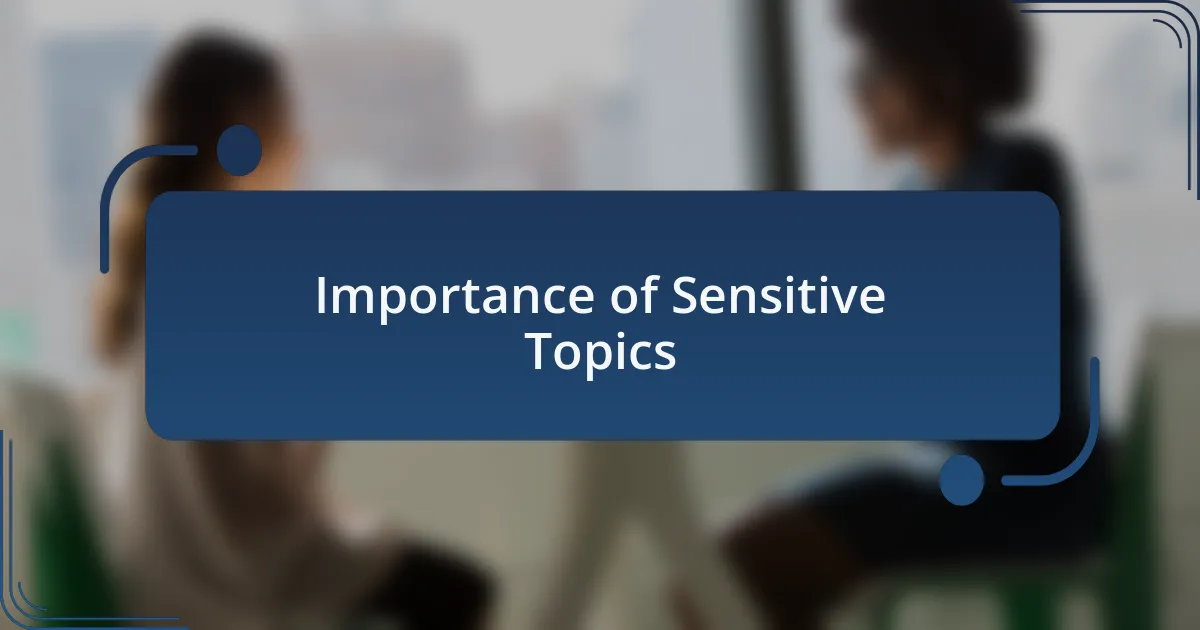
Importance of Sensitive Topics
Sensitive topics play a vital role in communication because they often touch on personal experiences, values, and emotions. I remember a time when discussing a friend’s loss uncomfortable feelings arose, yet the conversation brought us closer. Navigating such topics, I learned, requires not just awareness of the subject but also understanding the emotional weight it carries.
Addressing sensitive topics can foster deeper connections and promote understanding among individuals. I once hesitated to discuss my mental health struggles with a close friend, fearing judgment. However, when I finally opened up, it led to a profound exchange where we both shared our vulnerabilities. Have you ever felt that sudden relief when you realize you’re not alone in your struggles? It’s moments like these that highlight the importance of engaging with sensitive issues thoughtfully and compassionately.
Moreover, confronting sensitive topics can encourage growth and healing. I witnessed this firsthand while facilitating a workshop where participants shared personal stories that sparked transformative discussions. The atmosphere shifted from discomfort to empowerment, revealing how discussing difficult subjects can drive collective understanding and resilience. Don’t you think that fostering such openness is essential for personal and community growth?
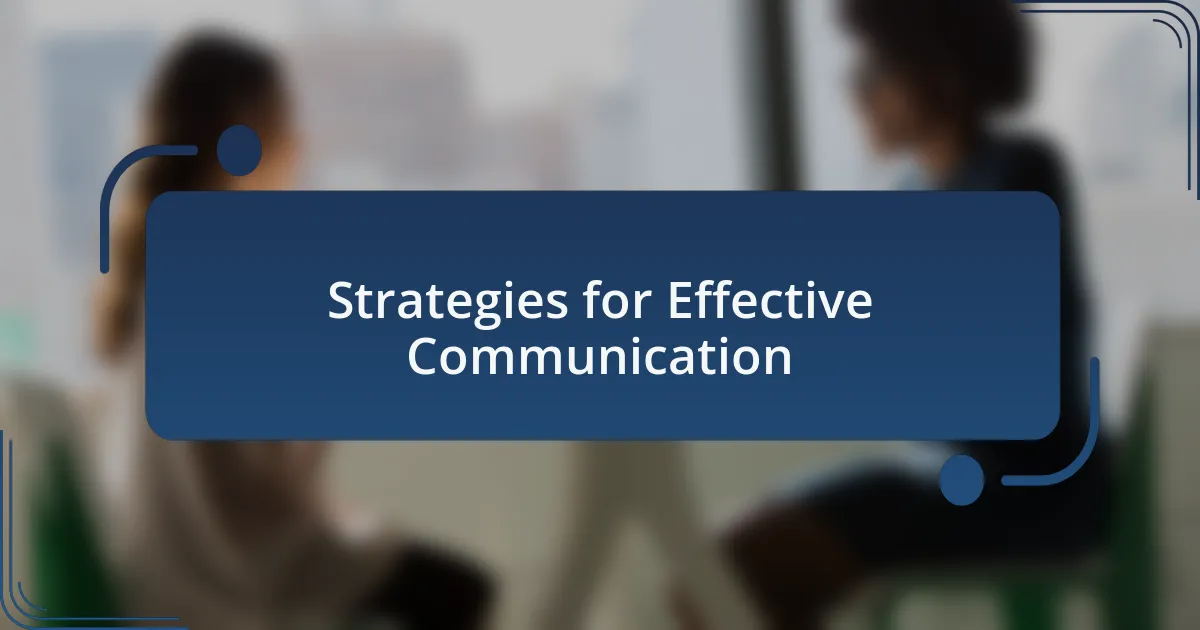
Strategies for Effective Communication
One effective strategy I’ve found in navigating sensitive topics is to establish a safe environment. I remember leading a discussion group where I made it a point to set ground rules, ensuring that everyone felt respected and heard. This approach didn’t just ease tensions; it created a space where individuals felt comfortable sharing their experiences without fear of judgment. Have you ever noticed how much easier it is to talk when you feel secure?
Active listening is another cornerstone of effective communication. I recall a conversation with a colleague about workplace stress. Instead of jumping in with my own experiences, I focused intently on what they were saying. I acknowledged their feelings and validated their perspective, which not only showed my support but also deepened our connection. Isn’t it amazing how simply giving someone your undivided attention can transform the dialogue?
Finally, I advocate for using “I” statements to express feelings without placing blame. In a tense conversation about family dynamics, I shared my emotions by saying, “I feel overwhelmed when…” rather than pointing fingers. This technique shifted the tone of the conversation to one of understanding and collaboration instead of defensiveness. Have you ever tried this method? It can truly change the dynamics of a sensitive discussion.
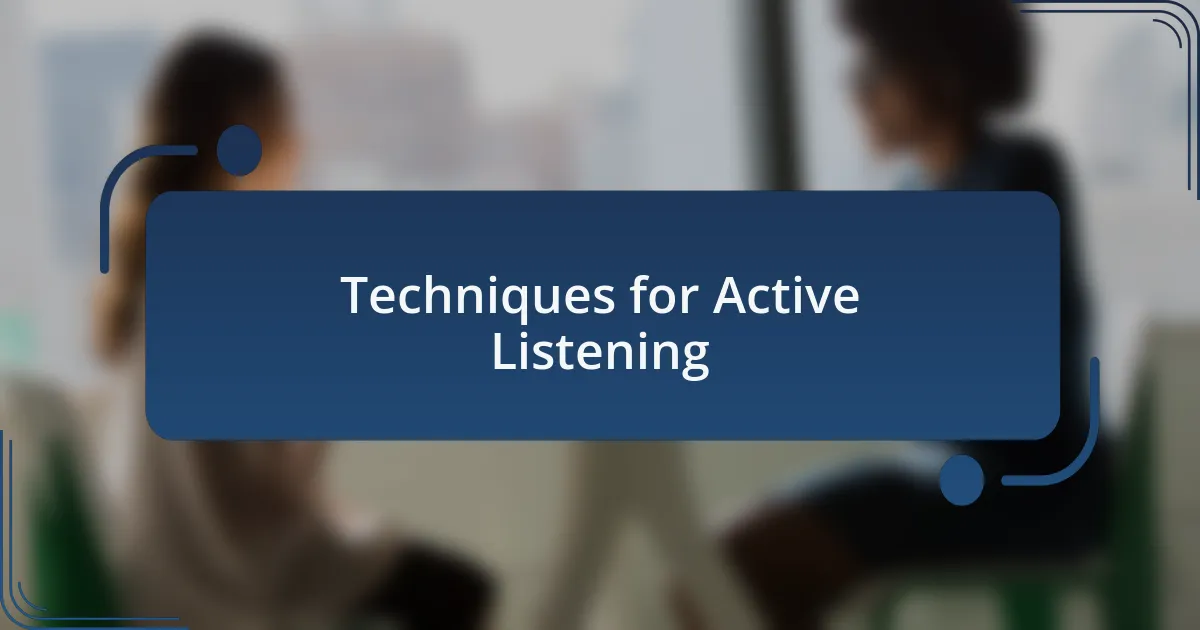
Techniques for Active Listening
When engaging in active listening, I find that reflecting back what the speaker has shared is incredibly powerful. For instance, during a difficult conversation with a friend, I paraphrased her concerns by saying, “So, you’re feeling stressed because you feel unsupported at work, right?” This not only confirmed my understanding but also provided her an opportunity to clarify her thoughts further. Have you ever tried mirroring someone’s feelings? It fosters a sense of validation that can really enhance connection.
Another technique I often use is asking open-ended questions. I remember guiding a discussion about personal growth, where I prompted others by asking, “What has been your biggest challenge in this journey?” This approach encourages deeper exploration of emotions and experiences rather than just surface-level responses. It’s fascinating how these questions can invite stories and insights that may have otherwise remained unspoken. Don’t you feel that when someone shows genuine curiosity, it can lead to richer conversations?
Moreover, I pay close attention to non-verbal cues like body language and tone. There was a moment in a family discussion where I noticed my brother’s body language shifted when he began discussing a sensitive topic. By acknowledging this change—asking him if he wanted to share more when I saw him hesitating—I created an opening for deeper dialogue. Have you noticed how tuning in to these subtle signals can lead to meaningful exchanges? It’s an art, really, one that can transform a simple conversation into a moment of genuine connection.
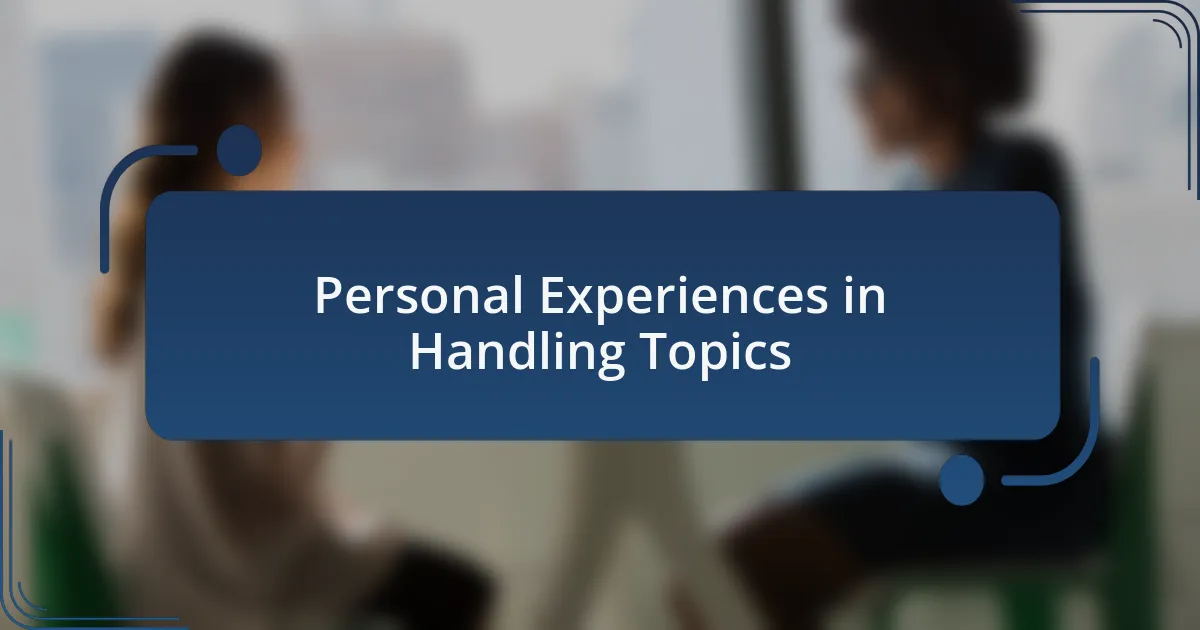
Personal Experiences in Handling Topics
When I navigated the sensitive topic of mental health with a close colleague, I felt the weight of my words. I shared my own struggles with anxiety and how it impacted my work. By being vulnerable, I created an environment of trust that encouraged them to open up about their experiences. Have you ever noticed how sharing your story can help others feel less alone?
In another instance, discussing a family member’s addiction was especially challenging. I approached the conversation with empathy, focusing on expressing concern rather than judgment. Instead of launching into a lecture, I asked, “What do you think has been the hardest part for you?” This shift in approach transformed the conversation from confrontation to collaboration. Have you tried shifting the focus to the other person’s perspective? It can lead to breakthroughs.
Reflecting on my experiences, I’ve realized the importance of patience during these discussions. Once, while addressing a friend’s relationship struggles, I made it a point to listen without interrupting. It was a simple gesture, but I could see relief wash over them. Why do you think it is that people often just need someone to hear them out? There’s a profound power in letting someone feel truly heard.
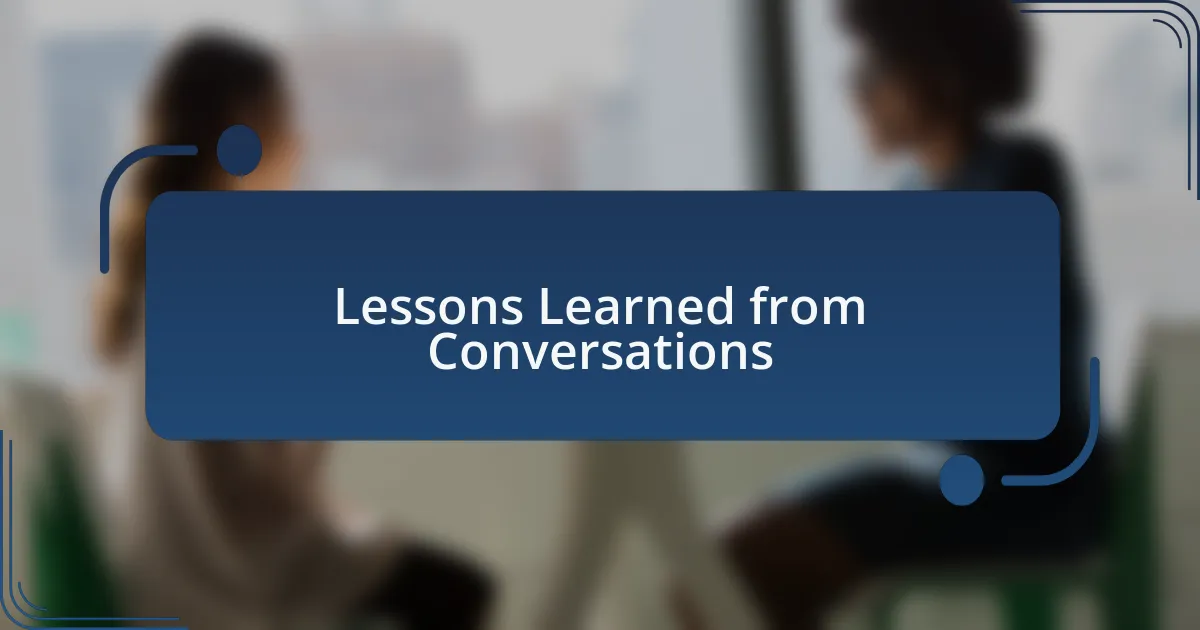
Lessons Learned from Conversations
In my conversations about grief, I learned that timing and tone are everything. I vividly remember sitting with a friend who had just lost a loved one. Instead of jumping straight to discussing memories or attempting to cheer them up, I simply sat in silence alongside them, offering my presence. It was in that stillness that they began to share their feelings. Have you ever felt how powerful silence can be in a moment of deep emotion?
Another lesson emerged when I tackled the topic of cultural differences during a team meeting. While discussing varying perspectives on work-life balance, I made it a point to ask open-ended questions, inviting my colleagues to share their backgrounds. Surprisingly, these conversations sparked a deeper understanding of each other’s values, leading to a more cohesive team dynamic. Isn’t it amazing how curiosity can foster connection?
Lastly, I’ve realized that asking for feedback can be transformative. Once, after discussing a sensitive issue with a family member, I asked, “How did this conversation land for you?” Their response opened a pathway to greater clarity and healing. Instead of assuming I knew how they felt, I learned that inviting their perspective enriched our dialogue. Have you considered how valuable feedback can be in conversations?
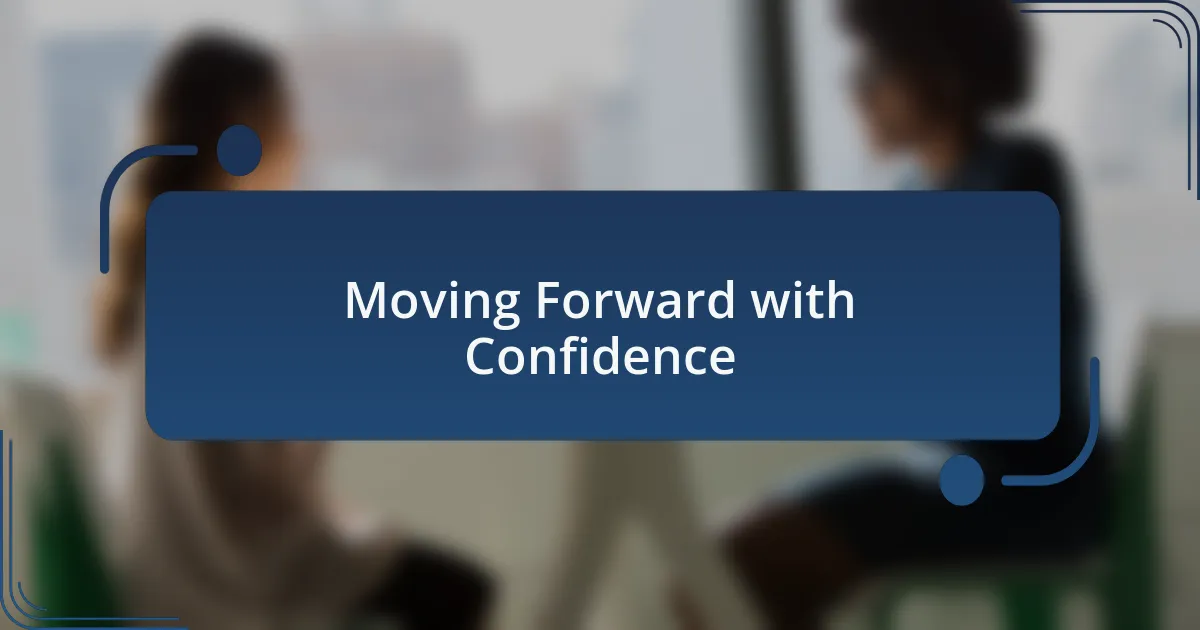
Moving Forward with Confidence
Moving forward with confidence means embracing the lessons gathered from past conversations. I recall a time when I broached a sensitive subject about a friend’s mental health. Armed with my understanding of their struggles, I approached the topic gently, choosing my words carefully. It was a mixture of anxiety and determination that propelled me into that dialogue. Have you ever felt a knot in your stomach before a crucial conversation? I decided to breathe deeply, knowing that my empathy would guide us both toward a better understanding.
As I navigated these delicate discussions, I discovered that confidence often stems from preparation and genuine concern. One evening, while discussing future plans with a colleague, I realized how important it is to align our conversations with shared values. This reflection helped me frame the discussion in a way that emphasized collaboration rather than confrontation. It’s fascinating how approaching an uncomfortable topic with an open heart can transform uncertainty into mutual respect and shared purpose, isn’t it?
In my journey, I’ve come to appreciate that moving forward confidently isn’t about having all the right answers; it’s about being open to the process. I remember the day I shared my thoughts on a controversial issue with my family. I felt my voice trembling, but I knew that honesty would facilitate growth. Wouldn’t it be wonderful if all our dialogues could embody that spirit of bravery? Embracing vulnerability allows us to connect more genuinely, creating a space where every voice matters and confidence flourishes.